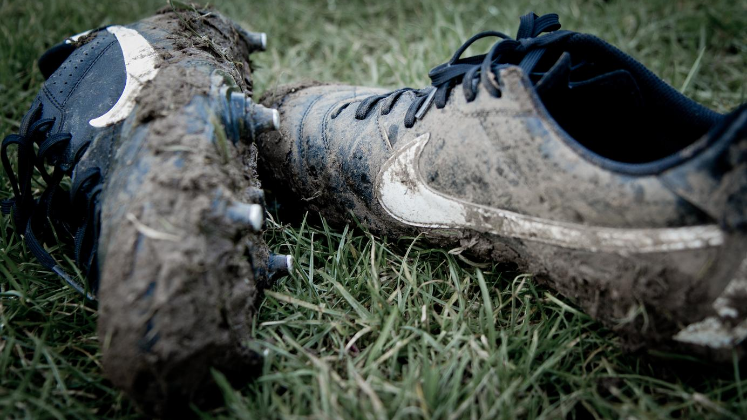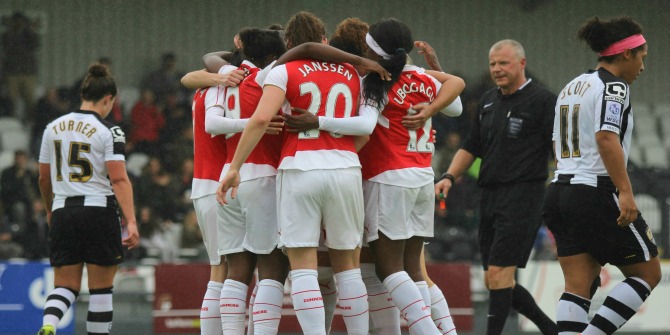In this author interview, we speak to Dr Paul Ian Campbell about his new book, Education, Retirement and Career Transitions for ‘Black’ Ex-Professional Footballers: ‘From Being Idolised to Stacking Shelves’, which explores black British male ex-professional footballers’ experiences of, and preparations for, retirement and career transition.
Q&A with Dr Paul Ian Campbell, author of Education, Retirement and Career Transitions for ‘Black’ Ex-Professional Footballers: ‘From Being Idolised to Stacking Shelves’. Emerald. 2020.
 Q: Your book draws on interviews, fieldwork and autoethnographic data to explore 16 black British male ex-professional footballers’ experiences of, and preparations for, retirement and career transition. What led you to examine this particular period in your participants’ footballing careers?
Q: Your book draws on interviews, fieldwork and autoethnographic data to explore 16 black British male ex-professional footballers’ experiences of, and preparations for, retirement and career transition. What led you to examine this particular period in your participants’ footballing careers?
The period of focus was the result of a number of factors. Firstly, around 2010, I started to receive a number of phone calls from friends who had been professional footballers and were coming to the end of their playing careers, asking for career advice. Questions were usually on accessing the job market and typically included: How do I get into a certain career? How do you prepare for an interview? What qualifications do I need to get into a certain line of work? What do I, or what can I, do now? The fact that these quite different men, whose only common features were that they had been professional footballers and their ethnicity, were all facing very similar post-career issues was the genesis for the project.
Secondly, once I started to read around the area of retirement, career transitions and sport, it became clear that the majority of research had been done using a psychological lens. The problem with this approach is that it often over-individualises the retirement process and any related complications, and tends to frame them in relation to over-inflated sporting identities, addictive personalities and so on. However, given that this issue was something that very different people were having, I wanted to explore the ways in which their experiences within the sub-cultural world of professional football – their unifying feature – had contributed to the issues they were facing.
Thirdly, during the interviews, it became apparent that many of the issues these men were facing could be traced, initially at least, to a lack of formal education-based qualifications and preparedness for work in more mainstream careers. Or put another way, why had they left compulsory education with little, if any, formal qualifications in education? Why had they failed to upskill during their time as soccer professionals? And how and in what ways did they circumvent or address their lack of qualifications when their playing careers had ended? To adequately analyse and discuss these emergent themes and account for the participants’ experiences as schoolboys, professionals and in retirement, the narrative spanned the period 1998-2014, which captured the three periods in all of these men’s lives.
Q: Despite the emphasis increasingly put on formal education in youth football from the 1980s onwards, your participants discuss navigating both an anti-education attitude in English professional football clubs and discrimination in the school system as black working-class students. How did these affect your interviewees’ experiences of formal education as schoolboy footballers?
For the most part, school was a hostile place for the participants. As black working-class boys, formal education did not easily fit with their own raced and classed habitus and masculine identities. School was a place where they received little positive affirmation from teachers and were often directed away from academic pathways such as college and university, and instead more enthusiastically directed to manual labour, apprenticeships and to sporting careers. This was despite the fact that some participants initially showed talent for their studies, especially in subjects such as Art and Geography. Teachers appeared to subscribe to wider racialised stereotypes around working-class black youth as more suited to physical pursuits and less to cerebral activities, as being aggressive and unruly and thus requiring heavy-handed policing. As such, many of the black and white participants recalled how either they or their black friends respectively often received more harsh penalties for low-level disruption than white peers, and for the same misbehaviour.
As you rightly point out, on one level, football’s governing bodies placed a high value on education, but within clubs and within professional club school of excellence centres, there existed a very anti-education culture. Part of this was connected to a general anti-education culture within professional football, but it was also connected to a particular set of expectations placed on young schoolboy footballers. To show to coaches that they possessed the ‘desire’ to become a youth trainee and a professional footballer, schoolboys were expected to sacrifice all else including friends, socialising and, if necessary, time given to education. Players who showed anything other than a laser focus on football were considered to not possess the adequate desire or commitment to make the grade, and risked deselection.
Importantly, other research has shown that young men were subjected to, and adhered to, these kinds of anti-education attitudes once they formally entered the professional game as Trainees and Scholars. What I illustrate here is that these kinds of expectations were impacting on the participants when they were schoolchildren and before they formally entered the sub-cultural world of professional football as soccer pros. These experiences, processes and pressures combined to negatively impact on the time these young men could give to their studies and how much time they actually spent in school at a crucial stage in their learning.

Q: In May 2019, Vincent Kompany spoke about acquiring a Master’s in business during his playing career, partly in preparation for retirement. However, you outline how many professional footballers are typically only encouraged to obtain coaching qualifications, if at all. Do you think footballers could be better supported in ‘upskilling’ during their careers?
Yes, but this is extremely unlikely given the sporting and economic priorities and pressures that clubs and managers face currently. Firstly, it should be noted that the union for professional footballers in England, The Professional Footballers’ Association (PFA), offers current and retired players a wide range of financial and educative support for upskilling during and after playing careers. However, these activities are only supported by the player’s employers, the club, if they do not clash with its primary priority, which is to win matches and ensure players are fully prepared for this outcome.
For players to receive meaningful support from their clubs to prepare for life outside of the game would require a radical shift in how players are perceived and what is mandated to fall within the jurisdiction of the club’s duty of care to their playing staff. The financial pressures and outcomes that come with winning and losing matches, competitions and with relegation, mean that currently clubs, chairpersons and managers have little time to invest in activities which do not directly relate to achieving these sporting goals. Or to invest in outcomes which do not directly affect the fortunes of the club.
Q: Many current players, retired players and managers have spoken out about the lack of black managers and coaches at elite level. To give just one statistic from your book, you note that in 2017, BAME players accounted for around 30 per cent of the overall playing workforce in the English game, but less than 1 per cent of senior coaching positions were occupied by BAME coaches (43). How did your participants view coaching qualifications and opportunities giving this glaring disparity?
As their careers came to end, coaching and management was the preferred career destination for almost all of the participants. Much of this was born out of the fact that coaching and management was a way to remain within the sporting routines, practices and culture to which they had become accustomed and immersed for most of their adult lives to this point. As such, all had obtained formal coaching qualifications in football from level 2 to the ‘pro’ license. While all recognised and accepted that they needed to have these qualifications to be able to ‘coach’, they remained highly skeptical of the value of qualifications for securing coaching and management work. They argued that their chances of getting work as coaches and managers were limited because of their racialised identities and because they were not connected to the right kinds of social networks.
Q: What were some of the difficulties and compromises in connecting to the right kinds of social networks for your participants?
Social networks in this case were the connections ex-players had established with peers, coaches and managers and were arguably the most decisive aspect in securing work in coaching. Players with good networks benefited from advance warning of new jobs and help securing important introductions. They provide coaching hopefuls with important and powerful referees who would vouch for, support and endorse their candidacy. If a player was not part of the right network, it was unlikely that they would get an interview, let alone a job.
It was also apparent that while, in general, friendship groups in professional football were multi-racial, intimate friendships – upon which social networks were largely formed – mostly consisted of people who were from the same race or region. With very few black people in positions of power in professional football, the ‘black’ social networks the ex-players in this study belonged to were frequently unhelpful for securing coaching work.
Importantly, the networks which were built around the club manager were the most advantageous in securing work in coaching. My participants described this as being on the ‘manager’s table’. This was in reference to the fact that to access this network, players would need to curry favour with the manager, and achieve this by being in their team – sitting at their table – during team quiz events, while travelling, or be in their office ‘talking football’ or socialising generally.
These networks were overwhelmingly white spaces, and thus to be a part of these networks often required the participants to perform, participate in or tolerate white working-class cultural practices and activities. This also meant at times having to put up with racialised humour and exclusionary ‘banter’. Put simply, to access these more advantageous and whitened networks, it often meant that black players had to compromise their own blackness and identity politics.
Q: Your book makes it clear that retirement and the career transitions it brings can be very difficult for professional footballers. What kind of work did your participants end up pursuing and what were some of the challenges they faced?
Initially, players moved into semi- (part-time) professional football and supplemented this with a range of different types of work. Most initially gravitated to sport-related work, where their physical prowess, sporting capital and skills were desirable and directly transferable. However, the move into sport-related work and semi-professional football was also about these men attempting to remain within sporting environments where they could continue to maintain their sporting identities and feel like footballers, albeit in an ephemeral way. However, a combination of low pay and physical deterioration accrued through years as a sporting professional meant that these ventures were often short-lived.
The participants soon relocated to more mainstream and conventional careers. Here the ex-players quickly had to physically and culturally adjust from working short days as soccer professionals in male-dominated spaces, to working longer 9-12-hour shifts, and in gender diverse spaces. Interestingly, what became apparent was that in this transition, the ex-players also had to adjust from careers where they were quite literally always on the move (physically), to work which required them to be stationary, such as driving, stacking shelves or working in office environments. Moreover, having to (re)train their bodies to sit in one position in an office or having to look at a computer screen all day – things which their new work colleagues’ bodies had become used to long ago – were activities which caused some participants distress and physical pain. The adjustment from sporting careers to mainstream work impacted on these men psychologically, socially and physiologically.
Q: Earlier, you mentioned the Professional Footballers’ Association. Are bodies like this a visible presence for retiring footballers?
This was an unusual situation, because the PFA does offer a wide range of financial, mental and educational support. However, to access these services, ex-players are required to seek them out. This is problematic. The moment the participants had become soccer professionals, they were cocooned within a host of interlinked support networks, consisting of clubs, agents and their union, the PFA, catering for all their needs, such as travel arrangements, sponsorship, boots, contracts, accommodation, doctors, dentists, passport registration and so on. Players were even provided with underwear for training and matches. Being immersed in this situation over time meant that players developed few skills for independence.
Ironically, it was exactly these kinds of skills, irrelevant to them as footballers, that are essential to locating the post-career education and retraining opportunities available. The inability to access these services offered by agencies and charities, such as the PFA and ‘XPro’, meant that retirement and everything that came with it – something that all the men described as the hardest thing they had ever experienced – was endured with little, if any, professional support and often in silence.
To address this, organisations such as the PFA need to be much more pro-active in seeking and reaching out to retired or retiring players, and employ a more robust system of keeping track of their members, so that existing and new after-career provisions and services are much more visible.
Q: Your book ends on a powerful note emphasising the importance of mental health support. As more high-profile players discuss their experiences and as a recent PFA study suggests that depression and anxiety have risen among professional footballers during the COVID-19 pandemic, what can be better done to support mental health in the game, especially for black footballers?
To avoid the issues highlighted in my work, I think the game needs to implement a formalised exit process and suite of support packages. This needs to start at the academy schoolchild level and be updated as players’ needs change as their careers develop. This needs to be a joined-up approach between the Football Association, clubs and the PFA. This should also include mandatory bi-annual mental health screenings and check-ups. In response to the issues highlighted in this study, alongside increasing levels of mental ill health among young people, this screening process should begin from the moment a player’s wellbeing falls under a club’s jurisdiction – when the young player joins the club as a schoolchild.
As my study has highlighted, this intervention is especially important for black footballers, whose biographies are evidently intersected by race, gender and sporting identities, which are each a high-risk category for mental ill health. It is really important to point out that black players are not prone to mental ill health because of the colour of their skin or DNA. This condition is more connected to the consistent and constant social and psychological challenges brought about by living in, and navigating, a society which continues to systemically, socially and structurally marginalise black communities.
This leads me to my final point about the current COVID-19 debate around the risks of restarting professional football leagues for black players. The extreme levels of physical conditioning techniques and nutritional surveillance that accompany a career as an elite-professional athlete suggest that black footballers may not be prone to many of the causal factors that are believed to have affected the disproportionately negative mortality rates experienced by BAME communities in relation to COVID-19 (diabetes, hypertension, exposure brought about being clustered in frontline services, etc). However, black footballers do not exist in a social vacuum and are often directly plugged into the very BAME communities and families where the impact of COVID-19 is much more lethal. So, while black players themselves may not be at an increased risk than their white peers (though the PFA has requested the Premier League conduct further research into the impact of COVID-19 on BAME players), the black families and communities which they might potentially carry the virus into remain so.
Note: This interview gives the views of the author, and not the position of the LSE Review of Books blog, or of the London School of Economics. The interview was conducted by Dr Rosemary Deller, Managing Editor of the LSE Review of Books blog.
Banner Image Credit: Photo by Fachry Zella Devandra on Unsplash.
In-text Image Credit: (Matt Preston CC by SA 2.0).








18 Comments